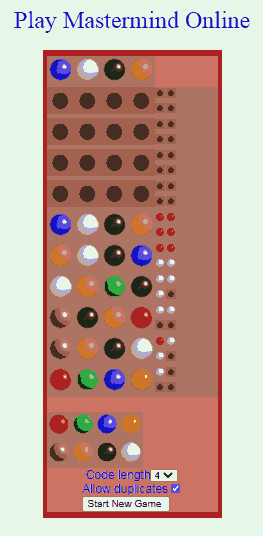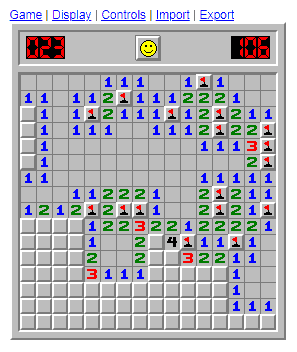I love and enjoy playing logic games. What’s more, I have used them in my teaching as well.
To be sure, letting students play games is not JUST about fun and games — as important as they are in their own right, especially in a classroom! There’s lots one can learn from them, especially when doing Science.
Mastermind, Mindsweeper, and Sudoku are three of a number of games I enjoy playing — both on my own as well as with friends. Mastermind was particularly popular with friends and colleagues when I was living in Malawi! They are all available online.



Analysis of Mastermind for the number of codes possible, or of Minesweeper for the number of games or of puzzles in Sudoku, for example, depending on who you are and/or how good you are in math, can be an easy problem to solve or a really tough one. Many are able to solve the problem by simply substituting the relevant numbers into a mathematically formula or applying a procedure they learned in statistics. But not everyone is able to describe WHY the formula works, that is, explain the logic or reasoning behind it, especially in a way that a layman understands.
Most Nepalis, including teachers I have run workshops for, I have discovered, are unable to do so. The reason? Nepali education system teaches students to memorize formulae and regurgitate them to solve familiar math problems they have already attempted in class. In other words, Nepali students are taught WHAT to think instead of HOW to think. Problem-solving is a skill NOT taught to students in Nepal.
I am offering online classes about problem-solving to bridge that gap!
I’ll be teaching about modeling, which, I suspect, only a small minority of students in Nepal are taught about, if at all. What’s more, many in Nepal likely associate or conjure up catwalks and models, mostly females, when they see the word modeling. Modeling, however, is something mathematicians and scientists also do…without cathwalks and women in skimpy dresses. Modeling a problem of scientific nature might not be anywhere near as sexy but often end up with a mathematical equation which solves, describes, and even explains the problem, and therefore intellectually gratifying!
These classes are available to anyone and everyone over 15 years of age. There are no other pre-requisites apart from that. They’ll be informal — like, the participants will NOT have to call me “Sir”! — which is NOT to say that I won’t have any lesson plans! Nor does that mean that you can come and just sit back, watch, and listen!
Even though we’ll be playing games from time to time, these session won’t be just games. They’ll be HIGHLY interactive. You will be required to participate and contribute regularly, including sharing your feelings and thoughts.
I’ll have you start from some easy tasks and problems and gradually have you model and attempt problems of increasing complexity. We’ll conclude with open-ended problems that requires the use of all or most of the skills you will have mastered. Having said that, on the other hand, the questions at first glance might appear to be quite complex but really won’t be when you have learned how to analyze and break them down, something you will be taught HOW to do.
The objectives behind these classes will be to impart
- some basic knowledge and understanding of the concept of MODELING (physical, conceptual, visual, mathematical modeling etc.)
- knowledge and understanding of the concept of ANALYSIS and the ability to analyze a problem by breaking it down into its parts and/or by simplifying it
- the ability to analyze data, information, processes in order to identify trends and patterns and arrive at insights about the way they change or vary
- the ability to use modeling to solve problems of mathematical nature (specifically about logic games) by deriving mathematical equations and explain them
- the ability to APPLY the equations derived (from/for logic games) to solve or gain insight into novel real-life problems
- knowledge and understanding of the concept of EVALUATION, and the ability to evaluate a solution or answer by arriving at the solution through completely different approach/process/thinking/analysis/model etc.
- knowledge and understanding of the concept of SYNTHESIS, especially in the context of problems about logic games, their solutions, and the insights one can derive about problems of such nature
- the ability to think through a problem
- knowledge and understanding of the concept of APPLICATION of transferable problem-solving skills
At the end of it all, you will have learned HOW to think — how to analyze, evaluate, apply, and synthesize.
Here’s how a very small group I am holding these classes for have rated these sessions so far:
You’ll also be asked to provide a reflection after each session. Here are some comments from them, reproduced verbatim.
“Smile on our face says it all…!”
“All puzzle pieces coming further at their places…now we have started using the knowledge we have gained so far, not just mathematical but in our practical lives as well”
“Everything is coming into place just like puzzles…starting right from the first session where we were brainstormed with sth that looked like way too tough to debunk(codebreaker game), which now seems quite simple as we go on learning what is really happening with the game algorithm”
“The concept of modelling will useful in my daily life whether personal or professional. I found this very useful, insightful and relevant. We have never been taught about modelling and now having learned what modelling is, I think I can be better at solving day to day problems more efficiently.”
(If you would like to read more testimonials from others I have presented to or have held workshops for, click here.)
So, are you game for a FREE FIVE-SESSION INTRODUCTORY classes? Do you want to come play online games with me?
If so fill out this online form. Each session will be about 75 minutes long and held in the evenings, twice or thrice a week. The schedule will be based on the responses I get in the form.
If you fill out the form but don’t hear from me at all, then assume that you have NOT been selected to participate. I’ll hold these introductory sessions for two groups to begin with. Each group will consist only of about 15 participants. The groups will be as mixed and as representative a group as I am able to make them based on the information you provide.
Incidentally, these sessions will MOSTLY or ENTIRELY be in English.
For a window into modeling and how I might be using it in these online classes, have a read of the blog post Nepali Education Teaches Students NOT to Think. Another one is Modelling…Without the Catwalk. Apart from playing and analyzing logic games, we’ll also tackle related problems, such as this: Card Problem, Exponential Growth, and COVID. Interested in more? Here they are: Master Your Mind Through…Mastermind I, Master Your Mind Through…Mastermind II, Rice Grains, A Chessboard, and Rings Around Saturn, Want to Get Swept Away by Mines?.
What do you think?
PS. For updates on classes etc. visit this blog regularly.
2:00 pm, Jan. 18, 2021 Update
I am no longer enrolling students for the first class, which will start this week.
To improve your chances of being selected, answer the questions properly and be available most or all evenings during the week. You’ll have to check out the online form to understand what I mean.
8:52 am, Feb. 14, 2021 Update
The enrollment for the second class of students ended this weekend. If you fill out the form expressing an interest in joining the class, they’ll start later in the future.
11:00 am, April 29, 2021 Update
Seeing as we are beginning yet another round of lockdown, I am accepting enrollment in the FREE, five introductory classes. If you are interested, fill out this online form. Be sure to select “Problem Solving” for the class and NOT “For The Love of Words.”
1:27 pm, Feb. 28, 2022 Update
I am NOT offering free classes until further notice.

This version of Mastermind is also quite fun: https://mastermindgame.net